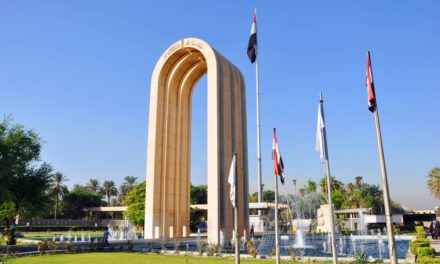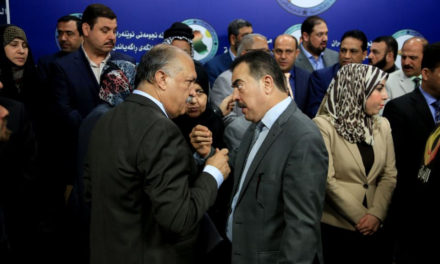“Be confident, but not too confident. Arrogance is off-putting.”
“Don’t put on too much makeup, it will reflect badly on your professional image.”
“Put on some makeup and wear something nicer than this, appearances matter.”
“Be flirty and perky. Smile more. No one likes a sourpuss.”
“Be serious. Don’t joke around too much or else people will think less of you and won’t take you seriously.”
“Don’t look too eager. Don’t look like you want it too badly. Don’t be forceful or else you will be seen as a threat.”
If you are a working woman anywhere in the world, then probably all of the above and more of the same has been said to you at some point in your career, by both men and women.
But let us leave the rest of the world for just a second and take a look at what working women in Iraq have to put up with. “It can’t be easy being a working woman in Iraq”, I hear many of you say, and all of you are quite right. Iraq is a male-centric country, life here revolves around men. As far as Iraq is concerned, men are the centre of the universe. The state, the laws, the traditions, and the dominant culture are all on their side.
But what about Iraqi women? Where do they fit in? How do they manage to exist in a patriarchal society that is still struggling to comprehend what their status should be?
The answers to these questions depend on many variables, the most important of which is of course is men. We have established before that social traditions and the dominant culture in Iraq are largely set up by men, so in places where the dominant culture is regressive women’s main purpose in life is to serve men and keep them happy, but in places where the dominant culture is rather liberal (and I am using the term liberal very loosely here) women can have relative freedom to exist on their own.
But even if you are a woman who lives in a place where you are allowed relative freedom, you still have to answer for everything to the men in your family because you are their “honour” and that is why you must never do anything that could have the potential of disgracing your family. The standards for what is disgraceful and what is not differ from one city to another and from one family to another.
It is a given that in Iraq women who work enjoy more freedom and independence than women who do not work. Many reasons are to blame for the fact that there are large numbers of unemployed women in Iraq: war and internal displacement, lack of education as many families would force their girls to quit school too soon due to societal pressure or economic hardship or both, premature marriages, regressive social traditions that frown upon women who work certain jobs, and severe shortage of job opportunities. Many Iraqis still view the private sector with skepticism and look down upon women who choose to work for private firms and as job opportunities in the public sector are extremely limited this causes many women to remain jobless even when they have all the required qualifications.
But what if you are an Iraqi woman who has an actual job? Then what? Is life going to be easy for you? Absolutely not.
You would still have to abide by a strict unwritten code that ensures that you do not “threaten” the men at your workplace under any circumstances. This code is all about how you choose to present yourself at your workplace: Your appearance, your hair and makeup, your behaviour, your interactions with your peers and superiors. In short in order to survive at the workplace you have to be “nice” and “non-threatening” at all times.
This code does not tell you to always show up on time, it does not tell you to work as hard as you possibly can, it does not tell you to be yourself and strive to find your own voice, none of that matters. The quality of the work that you do is not as important as your conformity to societal expectations.
You still have a choice though.
Choosing to conform is obviously much easier and will save you plenty of headache and heartbreak, but being your own person is much more rewarding. I have had countless conversations with junior female coworkers, and I always tell them to stop caring about what others at work (and especially male colleagues) think of them. People will always find something about you that they will criticize or highlight in a negative manner. If there is only one piece of advice that I would give my younger self it would be to stop paying attention to what others thought of me and make my primary concern being exceptional at doing my job.
One thing which I can never stress enough is that a work culture that focuses on presentation and appearances instead of actual job performance and work ethics is a corrupt and defective one. Iraq desperately needs an active and motivated workforce that is capable of making a difference and changing realities on the ground. Encouraging Iraqi working women to flourish and grow is not only the right thing to do morally, but it is also a sound economic policy. Being a public sector employee in Iraq does not have to be as disheartening and soul-crushing as it is often the case now. A better reality is possible to achieve, but radical reforms must be undertaken by the government to eliminate bureaucracy, tackle corruption, and implement culture of efficiency that is up to international standards all over state institutions before that happens.
A cultural shift is taking place in Iraq at a slow and yet a steady rate. Social phenomena that were not acceptable ten or twenty years ago are gradually making their way into the mainstream. More and more women are taking matters into their own hands and fighting against all odds to make their voices heard. We as a society have a collective responsibility towards those women, we need to encourage and support them and make them feel that they are not alone in their fight for equal opportunities. Hope lies with the younger generations, we just need to make sure that our cynicism does not infect them because the fate of this country lies on their shoulders. No pressure at all, Iraqi youths!

Noor Ali
Noor Ali is a resident of Baghdad and is a Middle East observer, mainly focusing on Iraqi social justice & women’s rights.










